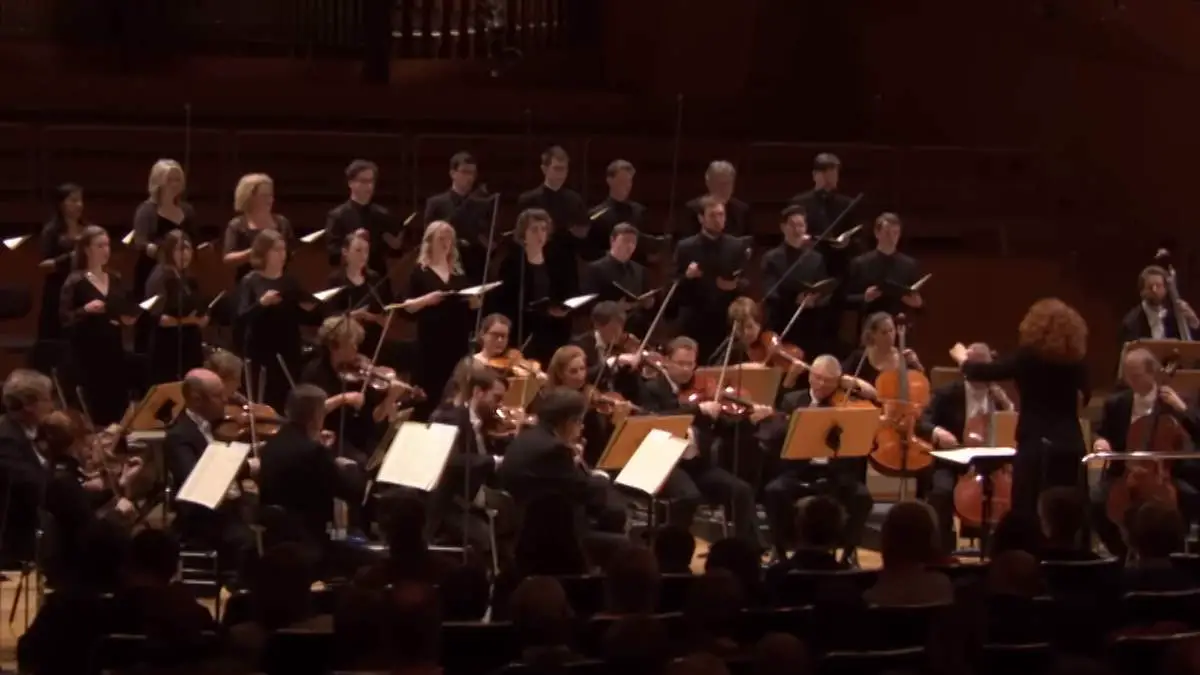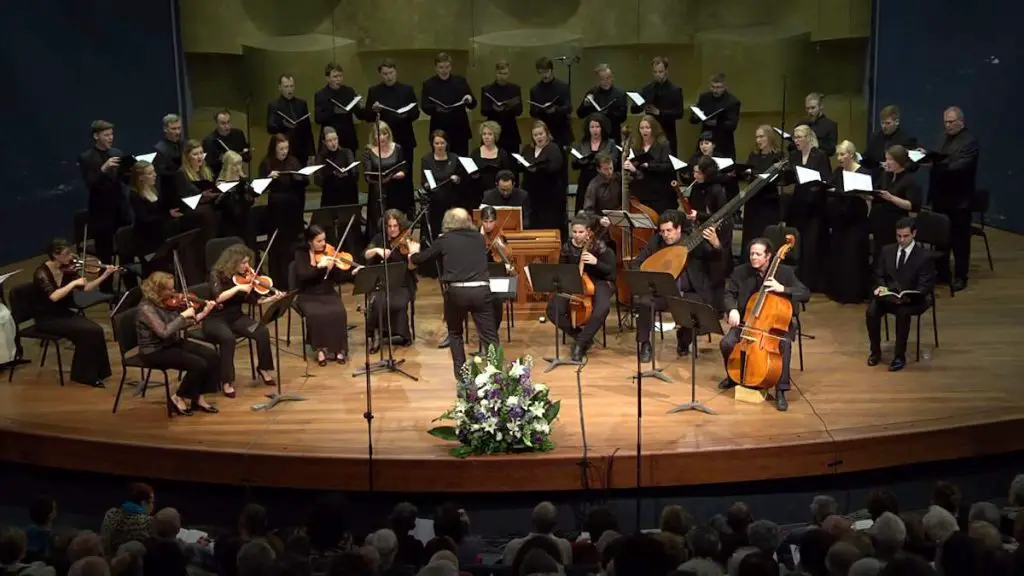Conducted by Emmanuelle Haïm, the hr-Sinfonieorchester and the Chœur du Concert D’Astrée perform Georg Friedrich Händel’s psalm setting Dixit Dominus (cataloged as HWV 23). The work uses the Latin text of Psalm 110 (Vulgate 109), which begins with the words Dixit Dominus (“The Lord Said”). Soloists: Emőke Baráth (Soprano), Lea Desandre (Mezzo-soprano), Damien Guillon (Countertenor), Patrick Grahl (Tenor), and Victor Sicard (Bass). This performance was recorded at the hr-Sendesaal, Frankfurt, on December 1, 2017.
Georg Friedrich Händel’s Dixit Dominus
George Frideric Händel’s “Dixit Dominus” is a powerful and compelling setting of Psalm 110, composed in 1707 during Handel’s early years in Italy. This work is notable for its youthful vigor and dramatic intensity, showcasing Handel’s mastery of both choral and orchestral writing at a relatively young age. Composed when Handel was just 22, “Dixit Dominus” represents one of the most ambitious and elaborate works of his early career.
“Dixit Dominus” is written for five vocal soloists, a chorus, and a small orchestra including strings and continuo. It consists of a series of movements that vary in style and texture, ranging from complex polyphonic choruses to affective solo arias. The music brilliantly reflects the text’s themes of power, conquest, and divinity, which speak of God’s promise to extend dominion and the reign of faith.
The work opens with a grand and vigorous chorus, setting a tone of majesty and authority that pervades the entire composition. The text of the Psalm provides a rich source of dramatic imagery, which Handel exploits to great effect, creating music that is both expressive and structurally sophisticated. The interplay between the soloists and the chorus throughout the piece adds to the dynamic and dramatic quality of the work, as Handel weaves together intricate vocal lines with bold orchestral passages.
The climax of “Dixit Dominus” is particularly notable for its dramatic intensity and the virtuosic demands it places on the performers. Handel’s use of counterpoint and his ability to conjure a wide range of emotions, from reverence and awe to aggression and triumph, demonstrate his compositional skill and his deep understanding of the text.
“Dixit Dominus” was written during Handel’s productive stay in Rome, where he was influenced by the music of the Italian masters and the vibrant cultural environment. This influence is evident in the vivid, dramatic style of the work, which combines Italian operatic elements with the rigorous structure of German choral music, foreshadowing the unique style that would later define Handel’s most famous oratorios.
Today, “Dixit Dominus” remains one of Handel’s most admired sacred works, frequently performed by choirs and ensembles around the world. It not only highlights his early genius but also represents a significant contribution to the Baroque choral repertoire, celebrated for its fiery energy and breathtaking beauty.
Movements and Texts
1. Chorus
The Lord said unto my Lord:
Sit thou on my right hand, until I make thine enemies thy footstool.
Dixit Dominus Domino meo:
Sede a dextris meis, donec ponam inimicos tuos scabellum pedum tuorum.
2. Aria
(alto solo) The Lord shall send the rod of thy power out of Sion:
be thou ruler, even in the midst among thine enemies.
Virgam virtutis tuae emittet Dominus ex Sion:
dominare in medio inimicorum tuorum.
3. Aria
(soprano solo) In the day of thy power shall the people offer thee free will offerings with holy worship.
From the womb before the morning star have I begotten thee.
Tecum principium in die virtutis tuae splendoribus sanctorum.
Ex utero ante luciferum genui te.
4. Chorus
The Lord swore, and will not repent:
Juravit Dominus et non poenitebit eum:
5. Chorus
Thou art a priest forever after the order of Melchisedech.
Tu es sacerdos in aeternum secundum ordinem Melchisedech.
6. Soloists and chorus
The Lord upon thy right hand,
shall wound even kings in the day of his wrath.
Dominus a dextris tuis,
confregit in die irae suae reges.
7. Chorus
He shall judge the nations,
fill the places with destruction, and shatter the skulls in the land of the many.
Judicabit in nationibus,
Implebit ruinas, conquassabit capita in terra multorum.
8. Soprano duet and chorus
He shall drink of the brook in the way,
therefore shall he lift up his head.
De torrente in via bibet,
propterea exaltabit caput.
9. Chorus
Glory be to the Father, and to the Son, and to the Holy Spirit.
As it was in the beginning, is now; and ever shall be, a world without end. Amen.
Gloria Patri, et Filio, et Spiritui Sancto,
Sicut erat in principio, et nunc, et semper, et in saecula saeculorum. Amen.
Sources
- Dixit Dominus (Händel) on Wikipedia
- Mendelssohn: Symphony No. 3 [Paavo Järvi, Tonhalle-Orchester Zürich] - May 16, 2024
- Brahms: Symphony No. 1 [Haifa Symphony, Bar Avni] - May 16, 2024
- Bach: Goldberg Variations [András Schiff] - May 15, 2024

